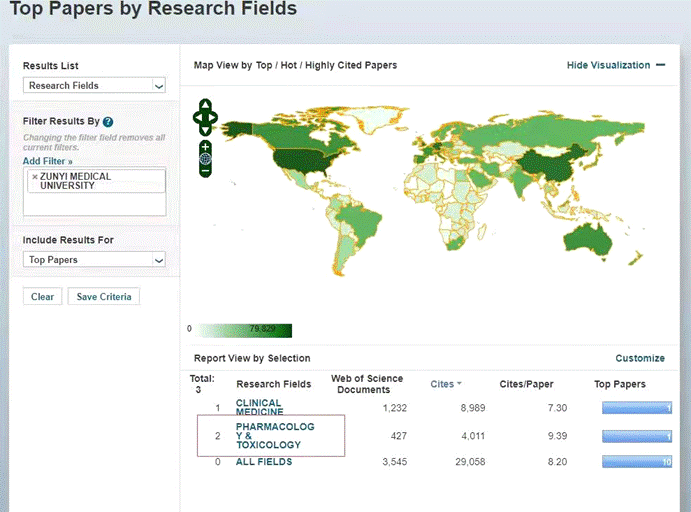According to the latest Essential Science Indicators (ESI) data released by Clarivate on January 13, 2022, the discipline of Pharmacology and Toxicology of our university entered the top 1% of ESI for the first time, realizing another breakthrough in ESI discipline construction. Up to now, two disciplines of Clinical Medicine and Pharmacology and Toxicology have entered the top 1% of ESI global ranking, which indicates that the related disciplines of the university have high academic influence in the international arena and the overall level of the disciplines has been significantly improved.
The university will take the successful approval of the doctoral degree granting unit as an opportunity to promote high-quality development as the main line, take "double first-class construction" as the lead, create high-level discipline teams, strengthen collaborative innovation, and constantly improve the discipline's ability to serve and support the development of local economic construction and the transformation of scientific and technological achievements, so as to push the level of discipline construction of the university to a new level.

Discipline of Pharmacology &Toxicology in ZMU
Founded by Zhang Yi, a famous pharmacologist and national professor in China, the Department of Pharmacology was the first to enroll graduate students for the whole country in 1955, and was awarded the first master's degree authorization point in 1981. Through the unremitting efforts of several generations, The discipline has the created following achievements:
1. The first batch of key disciplines in Guizhou Province in 1992;
2. Joint training doctoral students in 2001;
3. The "Key Laboratory of Basic Pharmacology in Guizhou Province" in 2006;
4. "Scientific and Technological Innovation Teams in Guizhou Province" in 2008;
5. "Guizhou Scientific and Technological Innovation Team" in 2008;
6. "Guizhou Biomedical Talent Base" in 2011;
7. "Guizhou Characteristic Key Disciplines" in 2008;
8. The first batch of "Guizhou Provincial Characteristic Key Disciplines" in 2011;
9. "Yangtze River Scholars and Innovative Teams Development Program" by the Ministry of Education of China in 2011;
10. National key (cultivation) discipline in 2012;
11. "Construction of Key Laboratory of Basic Pharmacology under the Ministry of Education of China in 2013;
12. "Joint Laboratory for International Cooperation in Specialty Ethnic Medicine, Ministry of Education"in 2016.
13. "Key Laboratory of Basic Pharmacology of the Ministry of Education" was officially approved by Ministry of Education in 2017.
The Department of Pharmacology insists on focusing on the applied basic research of traditional Chinese medicines and ethnic medicines, combining basic and applied research, and has formed five research directions, such as neuropharmacology, cardiovascular pharmacology, drug metabolism dynamics and drug toxicology, pharmacology of anti-infective and anti-inflammatory medicines, and anti-tumor pharmacology, etc. The Department has made remarkable achievements in pharmacological research of traditional Chinese medicines and ethnic medicines. We have studied the pharmacodynamics of Crocus sativus, Epimedium, Dendrobium, Dendrobium, Tianma and Wuzhu in the prevention and treatment of central nervous system diseases and cardiovascular system diseases, and carried out pharmacokinetic studies on some of their active ingredients, as well as conducted in-depth toxicological studies on proprietary Chinese medicines containing Andrographis paniculata and Cinnabar. The research results have won five awards at provincial and ministerial levels, including the Second Prize of National Scientific and Technological Progress, and have achieved remarkable results in the pharmacological research of Guizhou's local medicinal herbs and specialty ethnic medicines.
The Toxicology Department of our university carried out research on the metabolism of calcium, phosphorus, zinc, copper and magnesium of cadmium-exposed workers earlier in China in the 1980s, and began to train postgraduate students in health toxicology in 2006, and the research areas include manganese neurotoxicity and reproductive toxicity, cadmium toxicity to the liver, kidneys and bones, vanadium neurotoxicity, mycotoxins toxicity to the kidneys, as well as the mechanism of the protection of the liver and kidneys by wild papaya, a food with medicinal origin, research and product research and development. Research and product development. The research on early biomarkers of toxicant damage to the organism, especially manganese-induced neurological damage, is at the leading level in China.
